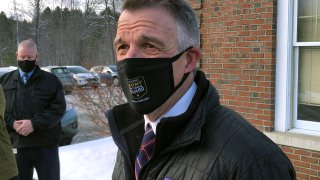
Vermont Republican Gov. Phil Scott speaks to reporters after voting on Tuesday, Nov. 3, 2020, in his hometown of Berlin, Vt. Scott said he voted for Democrat Joe Biden for president because he believes the former vice president can do more to bring the country together. He said it was the first time in his life he’s voted for a Democrat.
The University of Vermont Medical Center was expected to administer its first dose of the Pfizer vaccine Tuesday.
The state could receive as many as 34,000 doses of the vaccine by the end of the month, though it will still be "several months" before the vaccine is available to many residents. Those who receive the first dose will receive a second dose of the vaccine in 21 days, Vermont Health Commissioner Dr. Mark Levine said in a news conference Tuesday.
After a three-day period in which Vermont averaged over 100 new coronavirus cases a day, 66 new cases were announced Tuesday in a news conference with Gov. Phil Scott.
There were 771 new cases reported in Vermont this week, the highest number of cases in one week ever. Cases rose for the sixteenth week in a row, but just by 6 percent, compared to a 50 percent increase from the week before.
In the news conference, Scott likened the perseverance of Vermonters to their determination to get through the cold winters, followed by the difficult mud season.
"We still have months of hard work ahead, that's why it marks the beginning of the end," Scott said. "Time and time again, Vermonters reward my faith in them."
Local
Scott said the first 1,950 doses of the Pfizer/BioNTech vaccine arrived in the state on Monday. The State Vaccine Depot and the University of Vermont Medical Center in Burlington each received 975 doses.
“This is an important milestone and an essential step toward defeating a virus that’s devastated families and businesses throughout Vermont and around the globe,” Scott said in a statement. “There is no better, safer or faster way to defeat this virus and work to rebuild our economy than a successful effort to make vaccines available to every single Vermonter. We are committed to working with our partners to get this done, so we can get through this and be stronger and more resilient than ever before.”
The Vermont Department of Health was allocated weekly shipments of 5,850 doses of the Pfizer/BioNTech vaccine through December. On Tuesday, the Health Department will receive an additional 1,950 doses, and another 1,950 doses will ship later this week directly to pharmacies that have contracted with the federal government to administer vaccines at long-term care facilities. The Health Department, in coordination with the State Emergency Operations Center, will distribute vaccine to hospitals throughout the state.
Healthcare workers as well as those who live and work in long-term care facilities will be among the first to get the vaccine. People ages 65 and older, those with underlying conditions, along with essential workers are next in line to receive a vaccine.
Last week, Scott hailed the news that a coronavirus vaccine is nearing approval, but warned the state that, while there's a plan to distribute vaccinations to high-priority groups once they become available, the pandemic is still a danger.
"This is great news but we’re not out of the woods yet," he wrote in a Facebook post.
Scott noted that the region's case counts remain high, with rising hospitalizations and deaths as well.
He concluded that, "while it’s important to acknowledge the good news about the vaccine, we’ve got to remember that the virus is still our common enemy. Until enough people are vaccinated, we must keep doing what we’ve been doing: wearing a mask, avoiding crowds/gatherings and quarantining when necessary. Together, we can keep each other safe as we work our way toward the end of the tunnel."